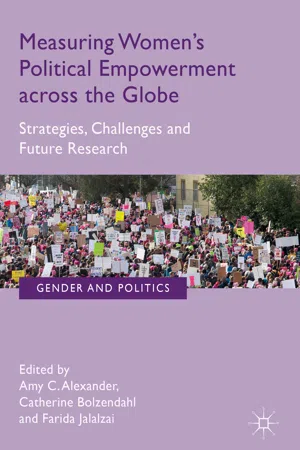On January 21, 2017, hundreds of thousands of people gathered in Washington, DC, in what is known as the “Women’s March.” Viewed as a call to action in response to Donald Trump’s official inauguration to the US presidency (which occurred the day before), marches were held in 673 cities across the country. Not only did these occur1 in major urban centers like Los Angeles, Chicago, and New York but marches spread to smaller (and more conservative) settings such as Erie, Pennsylvania, Oklahoma City, and Decorah, Iowa. Even more striking is that parallel women’s marches were held on every single continent worldwide. All told, nearly five million people, mainly women, marched on that day. Representing diverse groups, women and their allies mobilized around various issues spanning reproductive rights, environmental justice, and equal pay, among others. As such, women’s marches proved to be much more than a Trump counter-inauguration; they were a demand that women’s political empowerment take center stage globally. This presents a critical moment, one that calls for the assessment of women’s political empowerment worldwide, and builds off many factors leading to this point. By bringing together leading gender scholars in sociology and political science as well as practitioners, this edited volume provides a framework for understanding women’s political empowerment on such a global scale.
Few social changes have been as dramatic and rapid as women’s increased political represen tation worldwide (Paxton et al. 2006). Scholars and public figures rightfully tout these gains as remarkable evidence of greater gender equality, yet current academic and policy research faces a large lacuna in theoretical and empirical understandings of women’s political empowerment. Nowhere do women hold equal power to men in influencing and exercising political authority worldwide and efforts to increase women’s political agency are often actively and violently repressed. This combination of opportunity and limitations heightens the need for a comprehensive, global treatment of women’s political empowerment. In this volume, we therefore unite leading scholars to develop theoretical frameworks, methodological strategies, and research agendas for addressing these issues at every level of political authority.
Across these different approaches, this volume emphasizes three major axioms. First, gains in women’s political empowerment directly decrease the role of gender inequality as an obstacle to political incorporation. Women’s political empowerment is not a zero-sum game, and gender equality opens, rather than closes, the political domain to all members of society. Second, gender is a major organizing force in social relations across the globe, such that sex and gender are used simultaneously to create status inequalities that disadvantage women (Ridgeway 2011). Thus, women’s political empowerment requires special attention given that women are the largest categorical group today experiencing long-term, ongoing barriers to political incorporation worldwide. Third, inequalities in political empowerment cut across multiple statuses and other sources of inequality. Understanding how gender intersects with other barriers to empowerment is a central question, and women’s political empowerment should be viewed as a fundamental process of transformation for benchmarking and understanding more general political empowerment gains across the globe (e.g., UN Millennium Development Goals, http://www.un.org/millenniumgoals/; Hudson et al. 2012).
Responding to these issues means developing a broader research agenda related to women’s political empowerment. We must understand how social constructions of gender influence such outcomes and how these can be made relevant to a global scholarly and policy community.
Our efforts to build a comprehensive approach to women’s global political empowerment stand on the shoulders of many scholarly giants. Researchers across the social sciences have contributed a great deal of knowledge regarding women’s enhanced access to political power. Increasingly, scholars and policy-makers question the factors that induce women to become politically active and the impact politically empowered women have on social and political outcomes. From these questions, answers are beginning to emerge, especially in our understanding of women’s elite office holding (e.g., parliament and presidencies). Theoretically and empirically, however, our scholarship on the topic is uneven and incomplete. Before we undertook the research presented in this volume, a theoretically driven definition of women’s global political empowerment did not exist. Moreover, while much has been done empirically to understand the causes and consequences of women’s economic autonomy, global scholarship on women’s political empowerment remains narrow, mainly analyzing women legislators and/or quotas advancing women to the legislature (Krook 2010).
The goal of this volume thus is to bring together scholars to develop a broader vision of women’s political empowerment, to understand how social constructions of gender influence such outcomes, and to offer original research relevant to a global scholarly and policy community. Together, we work to improve our global understanding of women’s empowerment through cross-national comparisons, a variety of data types and a synthesis of methodological approaches. In particular the volume focuses on developing frameworks that address women’s political empowerment among elites, civil society, and in social processes. In doing so, we highlight the complexities and insufficiencies in the definition and measurement of women’s global political empowerment in a review of existing cross-national comparisons, data types, and methodological approaches.
In this introductory chapter we identify the complexities in defining women’s global political empowerment; critically review prior research on elites and masses to develop definitional and measurement goals; and, tie women’s global political empowerment to broader social concerns and processes. We then provide an overview of the chapter contributions from authors recognized as the leading scholars investigating questions related to gender ...
